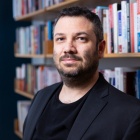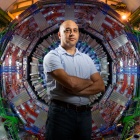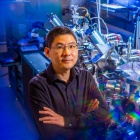
AI Research in the College
Artificial Intelligence (AI) research is shaping the future across all disciplines. From healthcare innovations to advancements in natural language processing and data science, our researchers are driving transformative projects that address global challenges. Explore how our faculty AI research initiatives are creating solutions that impact industries, communities and the world.
AI research happening across the College
This is only a selection of the AI research happening across the College.
Enhancing diagnostics, culturally competent communication and specialized education, innovative technology is revolutionizing a variety of areas. Research prioritizes ethical practices, inclusivity and fair access to tech-driven advancements, with a strong emphasis on cultural, social and linguistic diversity.


Geography
Uses AI to predict how contagious diseases like COVID-19 and the flu spread, focusing on vulnerable communities to support public health planning and protect at-risk groups.


Communication
Uses AI to detect violent behavior on social media and studies how AI-generated content influences teenagers' moral decision-making.


Romance Languages and Literatures
Working to develop Spanish-language AI app to help healthcare providers communicate more effectively with Spanish-speaking patients, enhancing cultural understanding and healthcare quality.


Communication
Researches the impact of AI on misinformation, media bias and transparency in journalism, aiming to make news more reliable for the public.


Communicative Disorders and Sciences
Creating AI tools to improve hearing health by assisting audiologists in diagnosing and treating sound sensitivity and related conditions.
AI can play a significant role in sustainable agriculture, biodiversity monitoring, climate science and pollution management. By predicting environmental impacts these advancements contribute to ecological health and the efficient management of resources.


Art
Uses satellite images and AI to map sustainable land use in Bali, documenting agroforestry practices to support eco-friendly agriculture.


Geography
Uses AI to predict and study the effects of natural disasters on communities with the goal of improving resilience, preparation and sustainable response strategies.


Biological Sciences
Combines AI and DNA sequencing to study the health impacts of environmental pollution and developing the Fish and Climate Change Database.


Earth Sciences
Uses machine learning to enhance models that predict ice sheet melting and rising sea levels.


Earth Sciences
Develops AI models to study the flow of ice in Greenland and its impact on climate change.


Environment and Sustainability
Examines how AI-driven automation affects organic farming, its environmental impact and farm labor.




Chemistry
Advances AI in recycling by using spectroscopy and machine learning to improve sorting of plastics and textiles for sustainable practices.
AI-focused research addresses transparency, bias reduction, misinformation prevention and value alignment to foster trust in technology. This is especially critical in media and public communication, where trust and accuracy are paramount.


Romance Languages and Literatures
Studies the role of AI in spreading disinformation, focusing on deepfakes and the polarization of content on social media.


Asian Studies
Explores machines and human speech in Urdu literature, linking historical views to AI language processing ethics.


Political Science
Studies how media affects political approval using multilingual AI language models.


Political Science
Uses language analysis and AI to study how U.S. laws are formed and interpreted throughout the judicial system, advancing understanding of legal language and the judiciary’s role.


Linguistics
Investigates biases in human and AI language processing and explores how AI aligns with human language understanding.


Philosophy, Politics and Economics
Develops AI alignment models that embrace and respect diverse societal values in AI outputs.


Communication
Researches how machines make decisions in automated journalism and the impact of hostile media bias, including public trust and transparency in AI.


Communication
Analyzes how TV and film in the U.S., Canada, and Australia influence character strengths like social intelligence and hope.


Media Study
Examines the conceptual and ethical aspects of AI in media studies, focusing on nonhuman agency and posthumanism.
Groundbreaking developments in quantum computing, physics and material science are driven by advanced tools, optimizing processes and enabling new technologies. AI research continues to underscore the transformative influence on fundamental sciences and solutions for societal and environmental challenges.


Psychology
Uses AI to study how people produce and understand language, helping improve cognitive models of language processing.


Mathematics
Uses mathematical models and AI to better understand how networks stay resilient and to address public health challenges.


Physics
Works on making AI decisions in particle physics clearer through relevance propagation techniques used in experiments at the Large Hadron Collider.


Mathematics
Examines the conceptual and ethical aspects of AI in media studies, focusing on nonhuman agency and posthumanism.


Physics
Applies AI to study quantum noise and photon behavior in quantum physics and also explores how AI can help sustainable plant growth.




Physics
Develops AI-based models to improve quantum computing materials and make material science calculations more efficient.


Physics
Uses AI to study how proteins move and function to understand disease mechanisms and improve knowledge of protein behavior.
This content was created in part with the assistance of Generative AI. By leveraging advanced artificial intelligence tools, we aim to provide clear, engaging and informative content. While AI plays a role in generating ideas and drafting text, each piece is reviewed and refined by professionals to ensure accuracy and quality.



